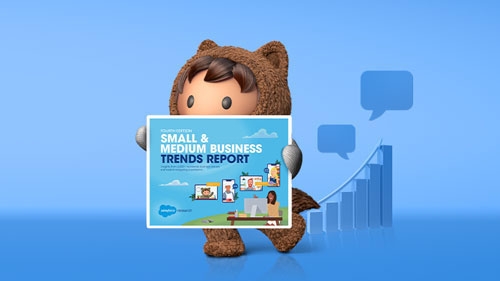Getting funding for your small and medium-sized business (SMB) is one of the biggest hurdles to cross as an entrepreneur. And every SMB owner will admit this: funding can make or break their business. Whether you’re just starting or scaling operations — understanding your funding options is the key to making the right financial decisions. Navigating the funding process can be overwhelming, but we’re here to help. Let’s explore various funding options and how they can help your business.
What you’ll learn:
- Why is funding important for small business growth?
- Does your small business need funding?
- What are the different types of funding options?
- Next steps: preparing for your funding search
- Small business funding opens new opportunities
Why is funding important for small business growth?
About one in five startups fail within the first year, primarily due to a lack of funding. SMBs rely on funding to invest in growth opportunities as they scale — from boosting operations to developing new products. It helps maintain healthy cash flow to handle daily operations while pursuing long-term initiatives. Plus, funding enables you to save up for rainy days and weather unexpected challenges.
Benefits of funding for a small business
Growing a business requires more than a great idea and hard work. It needs proper financial backing to thrive. Funding helps you capture market share and opportunities faster, overcome challenges, and stay sustainable. Here are some benefits:
- Access to working capital: Working capital is crucial for daily operations and managing cash flow. You’ll need funds to maintain inventory, pay salaries, manage operational costs, and handle unexpected expenses.
- Marketing and market expansion: Adequate funding allows you to implement marketing strategies and reach your target audience. This includes investing in digital marketing, advertising campaigns, market research, introducing new distribution channels for customer acquisition, and entering new markets.
- Talent acquisition and development: Funding helps you provide your team with competitive salaries, benefits packages, and opportunities for learning new skills and tools.
- Research and product development: Access to sufficient capital allows you to invest in research and development. It helps create new products, improve existing ones, and innovate to meet changing market demands and customer preferences.
- Investment in technology and equipment: You’ll get to invest in the right tools, machinery, and artificial intelligence (AI) to streamline operations and enhance product quality while meeting industry standards.
Start with SMB Basics
Does your small business need funding?
29% of SMBs fail because they run out of cash. You should watch out for some key signs that signal you need funding. Some signs include the following.
- You’re unable to invest in modern technology, equipment upgrades, and digital solutions. Staying competitive in today’s fast-paced business environment requires access to the right tools and technology..
- You need specific equipment, talent, or space to run or expand your business. Securing additional funding can push your business to reach the next level, even when the economy is erratic.
- The unpredictable market fluctuations are straining your finances. So, you require funding to bridge gaps during slow periods and maintain operations during seasonal downturns.
- You find it challenging to enter new markets or expand your SMB’s physical presence in a different location. You need capital to hire staff, increase inventory levels, or launch into other geographical areas.
- You need a boost to get past break-even. Tools like the U.S. Small Business Administration’s (SBA) break-even analysis template can help you determine your break-even point, or the point at which revenues equal expenses.
- You’re delaying payments to your vendors, leading to a failure in fulfilling your customer orders.
Kickstart your SMB with Starter Suite
Get started with CRM and see results from day one with Starter Suite — the all-in-one suite with the marketing, sales, service, and commerce tools you need to succeed.



What are the different types of funding options?
Finding the right funding source for your SMB depends on various factors, including your growth stage, industry, and financial requirements. You can access various funding options, from traditional bank loans to modern crowdfunding platforms. Here are a few funding options available for SMBs.
Federal grants and loans
Federal grants are financial awards from the government, and you don’t have to repay them. If your SMB meets specific criteria or serves certain public purposes, you can access them. However, business loans are borrowed money, and you must repay them with interest over time. They’re available from banks, credit unions, and other lenders. You can explore small business grants at Grants.gov, Challenge.gov, and GrantWatch.
Search for grants through databases like those linked above or by searching for terms like “small business grants” or “grants for [your business type or industry]” via your preferred search engine. Many public libraries also maintain subscriptions to grant databases like GuideStar or provide free training on how to seek grant funding.
SBA funds
Small Business Association (SBA) partners with approved lenders to provide government-backed loans to SMBs. This guarantee reduces the risk for lenders, making it easier to secure funding at favorable terms and lower interest rates. Plus, it offers various loan programs designed to meet different business needs — from working capital and equipment purchases to real estate and disaster recovery assistance. The following funding programs will give you an idea.
- 7(a) Loans: One of the most common SBA loan programs are the 7(a) loans. They offer up to $5 million for various business purposes, including working capital, equipment purchases, and expansion. These loans are more SMB-friendly as they’re flexible with longer repayment terms and lower down payments.
- 504 Loans: These loans help you buy major assets like real estate or equipment, offering long-term, fixed-rate financing up to $5.5 million with just 10% down. 504 Loans are available through Certified Development Companies (CDCs) — SBA’s nonprofit partners who support economic growth in their local communities.
- Microloans: These loans offer up to $50,000 for startups and SMBs managed by local nonprofit organizations. Microloans are particularly accessible for new businesses, those with limited credit histories, or entrepreneurs in marginalized communities who need smaller funding.
- Lender Match: This free feature from the SBA connects you with approved lenders in your area. You can receive multiple lending options within two business days by answering a few questions about your business. Lender Match helps you find the right funding solution for your needs.
- Disaster assistance: These are low-interest loans available to those affected by declared disasters. Disaster assistance helps repair or replace damaged property, equipment, and inventory or to provide working capital during recovery.
Nonprofits and business associations
Apart from government assistance, SMBs can also find funding through a variety of corporate funding sources. Here are a few that you should consider.
- National Association for the Self-Employed (NASE): NASE grants are worth up to $4,000 each. Members must be in good standing for at least three months before applying for a grant.
- Hello Alice: This platform offers a range of grants, funding opportunities, resources, and loans to SMBs. Recipients usually receive video mentorships from world-renowned leaders like Rebecca Minkoff and Kristin Bell. Plus, Hello Alice offers grant programs ranging from $5,000 to $25,000 through partnerships with major companies like Progressive, Mastercard, and Wells Fargo.
- Amber Grant Fund: This small business grant fund is open to women entrepreneurs. It provides up to $10,000 every month and $25,000 annually. Amber Grant Fund also offers a community of female entrepreneurs who create content and research reports to help women business owners.
- America’s Seed Fund: America’s Seed Fund offers up to $2 million in seed funding and takes zero equity. They also offer business mentorship from leaders and program directors. It’s an incredible option if you’re developing a product or venture rooted in innovation and research but lack the necessary resources.
Angel investors and venture capitalists
Angel investors are typically people who provide funding in exchange for equity in your business. Apart from bringing capital, they add valuable expertise and industry connections. Angel investors invest smaller amounts ($50,000 to $500,000) in early-stage businesses, while venture capitalists focus on larger investments ($1 million+) in businesses showing high growth potential and scalability. Both expect significant returns on investment (ROI) and might want involvement in company decisions.
Get ready for Salesforce Foundations
Easily activate Foundations in your existing CRM to add key features in Agentforce, Sales, Service, Marketing, Commerce, and Data — all for free.


Next steps: Preparing for your funding search
Starting your funding search can feel overwhelming, but breaking it down into strategic steps makes it more manageable. Let’s find out how.
Update your business plan
Any business that wants to apply for grants should have a clear, concise idea about what they need and why. Evaluating your current business plan and how it can evolve with more capital will help you build a strong case for that funding. The following steps will further help you refine your strategy.
- Determine how much money you need to scale for the next few years. Your business plan and growth strategy should cover this.
- Compare multiple funding options to determine which best fits your business.
- Apply for the grants you selected, and ask mentors to review your application.
- First, clearly define why you need the funds and what you plan to achieve with the additional capital. This clarity is essential for securing funding and making informed decisions on its use.
Get your documentation ready
Prepare essential paperwork, including financial statements, tax returns, bank statements, and licenses. Most funding sources will require detailed documentation about your business’s financial health and operations. We recommend organizing these documents to streamline your application process. Besides, this shows your professionalism to potential lenders.
Evaluate your technology requirements
Assess your current technology stack to identify any gaps and determine the necessary upgrades. Whether it’s upgrading your point-of-sale system (POS), implementing a customer relationship management (CRM) tool, or investing in commerce platforms, understanding your tech needs will help determine your funding requirements. Plus, it shows your lenders that you have a clear plan for modernization.
Starter Suite gives you a 360-degree view of your SMB’s sales, service, marketing, and productivity. We’ve kept your needs in mind to create a small-business-friendly tool that you can start using from day one. It comes with AI features like Agentforce to help you grow and scale your SMB.

Search close to home
Consider crowdsourcing, asking friends and family for loans, or visiting your local bank to learn more about their options. Many cities and state governments can help. Also, check out your state small business resources guide to find a program near you.
Small business funding opens new opportunities
Once you’ve secured funding, investing in the right technology is essential for your growth. With Starter Suite, you can gain a comprehensive view of your business and its financial health. You can also identify which areas of your business need more support and uncover growth potential. This information will help you allocate your funding effectively.
Start your journey with a free trial of Starter today. Looking for more customization? Explore Pro Suite. Already a Salesforce customer? Activate Foundations to try Agentforce.
AI supported the writers and editors who created this article.






























